1. Scientific Perspectives on Gemstone Energy and Healing Claims
The idea that gemstones possess intrinsic healing powers has persisted for centuries, but modern science separates fact from folklore. While millions use crystals for emotional balance, research attributes their effects largely to the **placebo effect** and psychological conditioning. Studies show that handling stones can reduce anxiety, akin to mindfulness practices, but no empirical evidence supports claims of curing diseases. For example, a 2024 *Journal of Complementary Medicine* review concluded that gemstone therapies lack measurable biological impact, though their aesthetic appeal enhances mood and relaxation.
1.1 Do Gemstones Have Measurable Energy?
Gemstones exhibit unique physical properties—like quartz’s piezoelectricity (used in watches and electronics)—but these traits don’t translate to human health benefits. Quartz crystals generate electricity under pressure, yet wearing them won’t regulate bodily functions. Similarly, magnets and gemstone-infused bracelets marketed for pain relief lack clinical validation. Any perceived benefits stem from associative memory: holding a calming stone like **amethyst** might trigger stress-reduction responses learned through repeated use.
1.2 Psychological Benefits vs. Medical Claims
While gemstones can’t heal physical ailments, they may improve mental well-being through symbolism. A 2023 Harvard study found that participants who believed in crystal healing reported short-term stress relief, likely due to the **mind-body connection**. However, experts warn against substituting professional medical advice with crystal therapies. For instance, relying on **bloodstone** to detoxify instead of seeking treatment for liver issues could worsen health outcomes. Use gemstones as complementary tools—not replacements—for evidence-based care.
2. Common Healing Myths and Cultural Misconceptions
2.1 Popular Gemstone Beliefs: Origins and Reality Checks
- Rose Quartz – “Stone of Love”: Ancient Romans associated pink quartz with Venus, the goddess of love. Modern users claim it attracts relationships, but there’s no scientific basis for this. Its soft hue may subconsciously evoke warmth and empathy, but emotional connection requires human effort, not metaphysical forces.
- Lapis Lazuli – Wisdom Enhancer: Egyptians revered lapis for its ultramarine color, using it in crowns and religious artifacts. Today, it’s sold as a tool for “truth-seeking.” While its blue hue (symbolizing trust) might inspire introspection, intelligence and honesty develop through learning and life experience—not mineral properties.
- Tourmalinated Quartz – Energy Protector: A blend of quartz and black tourmaline, this gem is marketed to “absorb negative energy.” Though black tourmaline conducts electricity (making it useful in tech), no evidence shows it neutralizes emotional stress. Placebo comfort may help wearers feel grounded, but scientific grounding relies on psychology, not gemstones.
2.2 The Risks of Blurring Myth and Medicine
Misinterpreting gemstone symbolism as literal healing can lead to dangerous decisions. Cases exist where individuals delayed cancer treatment relying on “healing crystals,” only to face worsened prognoses. Store-bought “energy-charged” stones often lack verification of authenticity or metaphysical claims. Always consult healthcare professionals for serious conditions, and approach crystal use as a mindfulness aid—not a miracle cure.
2.3 Ethical Use: Balancing Tradition and Skepticism
Cultural narratives enrich human history, but conflating tradition with science is problematic. For example, Ayurvedic medicine links **sapphires** to planetary influences, while Western lore ties **garnets** to protection in battle. Enjoy these stories as artful expressions of humanity’s relationship with nature—but prioritize verified knowledge when health is at stake. Ethical retailers transparently separate folklore from factual product descriptions, fostering informed consumer choices.



I’ve always been curious—has anyone actually felt a noticeable difference in their energy or mood when wearing certain gemstones, or is it more of a placebo effect? Would love to hear personal experiences!
I’ve always been curious—has anyone actually felt a noticeable difference in their energy or mood when wearing certain gemstones, or is it mostly a placebo effect? Would love to hear personal experiences!